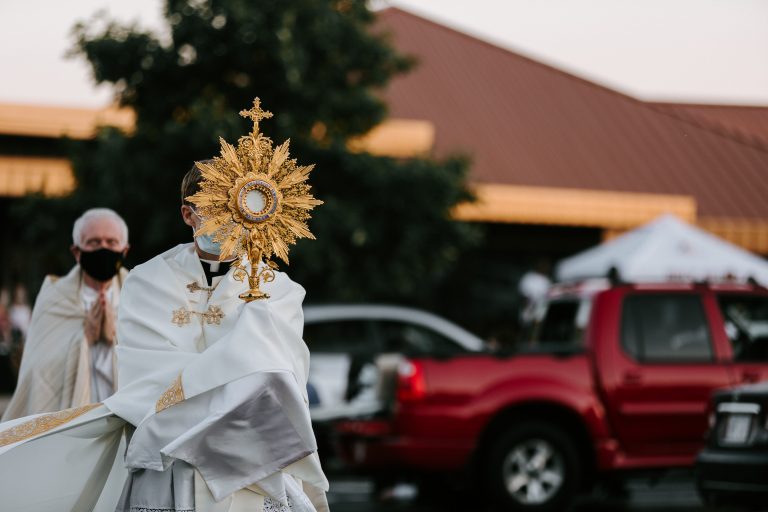By Ralph Martin
Ralph Martin is the president of Renewal Ministries and Director of Graduate Theology Programs in Evangelization and a professor of theology at Sacred Heart Major Seminary in the Archdiocese of Detroit. He holds a doctorate in theology from the Angelicum University in Rome. Pope Benedict XVI appointed Martin as a Consultor to the Pontifical Council for the New Evangelization. He was also appointed as a peritus for the Synod on the New Evangelization which was held in Rome in 2012. Martin is the author of A Church in Crisis.

A firm and clear grasp of Christian truth must be the basis of our relationship with God and with those we are trying to serve. One of the great weaknesses of both the pre- and post-Vatican II Church has been a widespread tendency to presume that Catholics already understand and are trying to live the fundamentals of the faith. Many millions do not, as survey after survey makes abundantly clear. A recent Pew study indicated that only 26 percent of Catholics under age forty believe in the Real Presence of Jesus in the Eucharist. As a result, many houses have been built on sand, with no sure foundation of Christian truth, as is evidenced by how easily so many millions of Catholics are being passively swept along with the culture.
The basic truths of creation, sin, and forgiveness, the sacrifice of Christ on the Cross, the Resurrection, the gift of the Holy Spirit, the Church, the Sacraments, the Second Coming, and the final judgment should never be presupposed, even in ourselves. They must be solidly built into and constantly renewed in our own lives and the lives of those for whom we have responsibility.
There has been a tendency in the Catholic Church for the Christian truths to be intellectually held and perhaps accurately expressed, but not adequately incarnated in life or action. Often this has been due to what Spanish bishop, Juan Hervas, one of the founders of the Cursillo Movement, called the “minimalist corruption of the Gospel.” By this, Bishop Hervas meant the tendency in practice to ask less of Catholics than what the Gospel asks and to offer less than what the Gospel offers.
This has resulted in the widespread practice of a “lukewarm” Catholicism, one that is extremely vulnerable to deception and seduction. Scripture makes it clear that God does not look kindly on a lukewarm Christianity: “I know your works: you are neither cold nor hot. Would that you were cold or hot! So, because you are lukewarm, and neither cold nor hot, I will spew you out of my mouth” (Rev 3:15–16).
“Normal” Christianity must ask of people all that the Gospel asks: total commitment. It must offer all that the Gospel offers: most especially, for our purposes here, the gift of the Holy Spirit, which brings Christian truth to life, generates Christian experience, and motivates and guides Christian action, indeed, makes possible the “new evangelization.” Christian truth is meant to bring life, to cause the release of the power of the Holy Spirit in the lives of Christians. Unless this happens, Christianity is subnormal.
“All who are led by the Spirit of God are sons of God” (Rom 8:14).
While the firm and clear foundations of Christian truth and the empowering of the Holy Spirit are essential to any adequate vision of Christianity, the guiding action of the Holy Spirit is uniquely important. Only the Spirit of God knows the depths of God, the depths of our own soul, and the real situation of the world and guides us along the only truly wise course for individuals, the family, the parish, the diocese, the religious order, and the universal Church. Seeking God directly for his guidance and developing a sensitivity to the leading of the Holy Spirit is crucial for adequate Christian life and action today. Scripture calls the person “foolish” who doesn’t seek God—and it is a very bad thing to be called a “fool” by the inspired Word of God.
One of the great sins we need to acknowledge and confess is our neglect of actively seeking God’s guidance for the situations we face as individuals and as a people. One of our great problems as a Church is that we have too many “natural” men and women—be they liberals or conservatives, pragmatists or intellectuals, educated or uneducated—and not enough men and women who are “spiritual” men and women led by the Spirit in their life and work.
This failure to submit our plans to God’s Word and to the leading of his Spirit is one of the main causes for the emptiness and lack of fruit of so much “renewal.” Scripture urges us and assures us: “If any of you lacks wisdom, let him ask God, who gives to all men generously and without reproaching, and it will be given him” (Jas 1:5). Sometimes, when I’m puzzling over something connected with the faith, I all of a sudden recall this verse and realize I have been trying to figure something out by myself and neglecting the generous offer of God to give us wisdom if we lack it. I quickly acknowledge my lack and ask God for wisdom, and quite often the “answer” to what I was puzzling over comes very soon indeed.
May we heed the call of Scripture before it is too late.
Learn More

In A Church in Crisis: Pathways Forward, Martin offers a detailed look at the growing hostility to the Catholic Church and its teaching. With copious evidence, Martin uncovers the forces working to undermine the Body of Christ and offers hope to those looking for clarity.